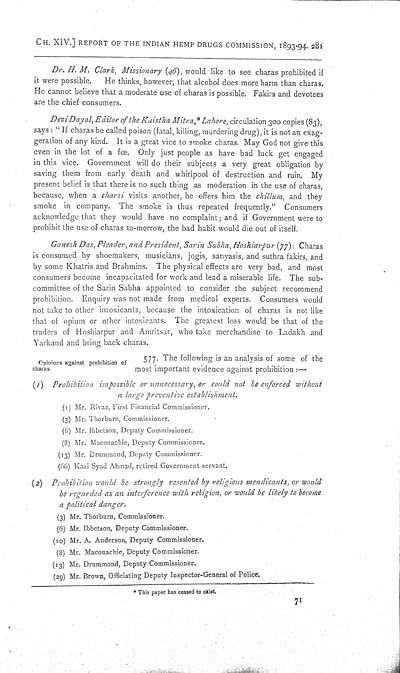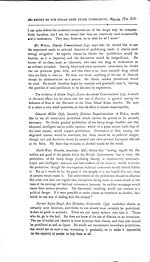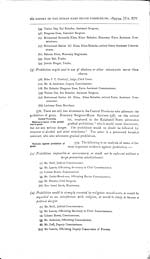Medicine - Drugs > Report of the Indian Hemp Drugs Commission, 1894-1895 > Volume I
(315) Page 281
Download files
Individual page:
Thumbnail gallery: Grid view | List view

CH. XIV.] REPORT OF THE INDIAN HEMP DRUGS COMMISSION, 1893-94. 281
Dr. H. M. Clark,
Missionary (46), would like to see charas prohibited if
it were possible. He thinks, however; that alcohol does more harm
than charas.
He cannot believe that a moderate use of charas is possible. Fakirs
and devotees
are the chief consumers.
Devi Dayal, Editor of
the Kaistha Mitra,* Lahore, circulation 300 copies (83),
says: "If charas be called poison (fatal, killing, murdering drug),
it is not an exag-
geration of any kind. It is a great vice to smoke charas. May God
not give this
even in the lot of a fœ. Only just people as have bad luck get
engaged
in this vice. Government will do their subjects a very great
obligation by
saving them from early death and whirlpool of destruction and ruin.
My
present belief is that there is no such thing as moderation in the
use of charas,
because, when a charsi visits another, he offers him the
chillum, and they
smoke in company. The smoke is thus repeated frequently."
Consumers
acknowledge that they would have no complaint; and if Government
were to
prohibit the use of charas to-morrow, the bad habit would die out
of itself.
Ganesh Das, Pleader,
and President, Sarin Sabha, Hoshiarpur (77): Charas
is consumed by shoemakers, musicians, jogis, sanyasis, and suthra
fakirs, and
by some Khatris and Brahmins. The physical effects are very bad,
and most
consumers become incapacitated for work and lead a miserable life.
The sub-
committee of the Sarin Sabha appointed to consider the subject
recommend
prohibition. Enquiry was not made from medical experts. Consumers
would
not take to other intoxicants, because the intoxication of charas
is not like
that of opium or other intoxicants. The greatest loss would be that
of the
traders of Hoshiarpur and Amritsar, who take merchandise to Ladakh
and
Yarkand and bring back charas.
Opinions against
prohibition of
charas.
577. The following is an
analysis of some of the
most important evidence against prohibition:—
(1) Prohibition
impossible or unnecessary, or could not be enforced
without
a large preventive
establishment.
(3) Mr. Thorburn, Commissioner.
(6) Mr. Ibbetson, Deputy Commissioner.
(8) Mr. Maconachie, Deputy Commissioner.
(13) Mr. Drummond, Deputy Commissioner.
(66) Kazi Syad Ahmad, retired Government servant.
(2) Prohibition would
be strongly resented by religious mendicants, or
would
be regarded as an
interference with religion, or would be likely to
become
a political
danger.
(3) Mr. Thorburn,
Commissioner.
(6) Mr. Ibbetson, Deputy
Commissioner.
(10) Mr. A. Anderson, Deputy Commissioner.
(8) Mr. Maconachie, Deputy
Commissioner.
(13) Mr. Drummond, Deputy Commissioner.
(29) Mr. Brown, Officiating Deputy Inspector-General of
Police.
* This paper has ceased to exist.
71
Set display mode to: Large image | Zoom image | Transcription
Images and transcriptions on this page, including medium image downloads, may be used under the Creative Commons Attribution 4.0 International Licence unless otherwise stated. ![]()
| India Papers > Medicine - Drugs > Report of the Indian Hemp Drugs Commission, 1894-1895 > Volume I > (315) Page 281 |
|---|
| Permanent URL | https://digital.nls.uk/74574696 |
|---|---|
| Description | Chapter XIV, cont. |
| Description | [Volume 1]: Report. |
|---|---|
| Attribution and copyright: |
|




